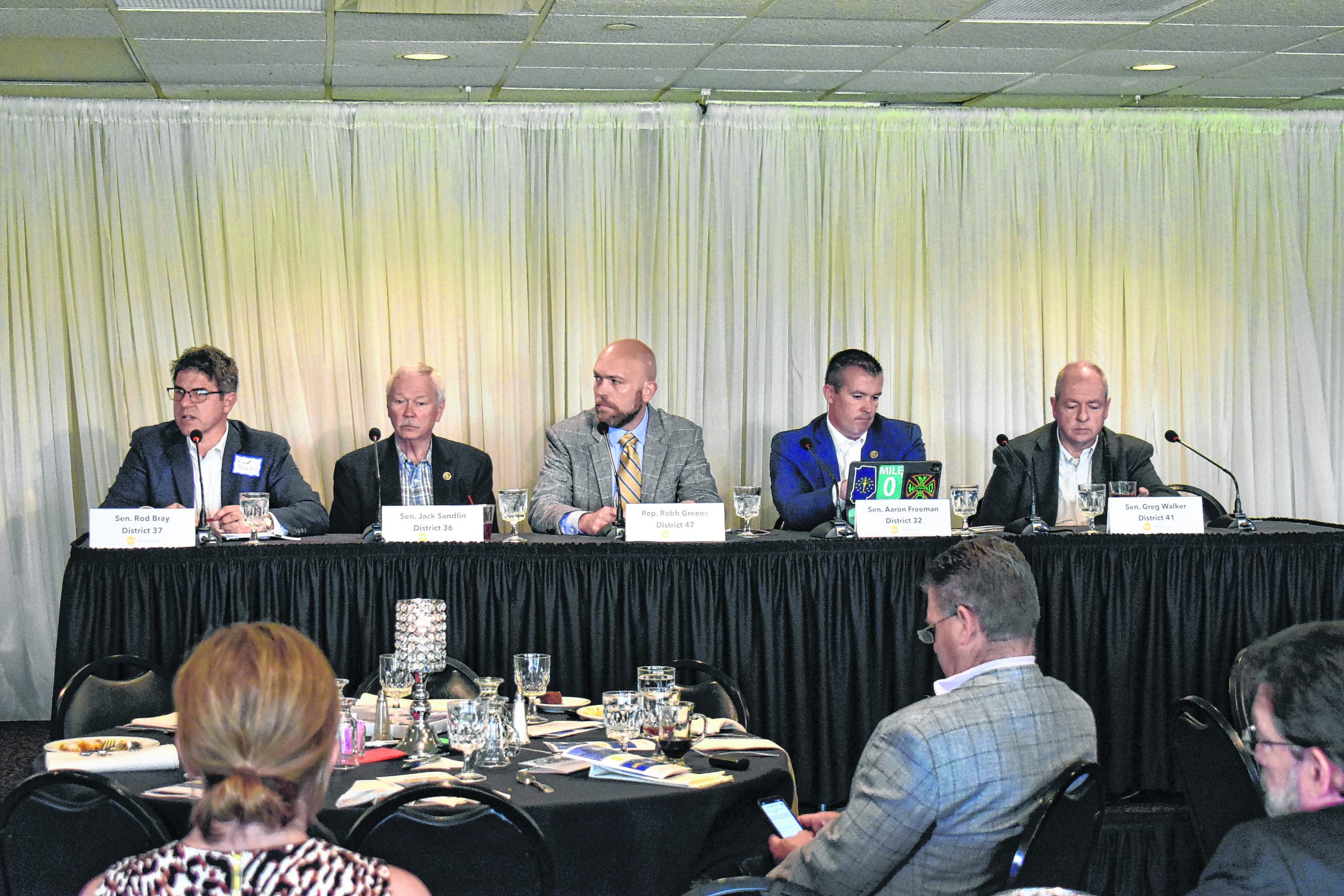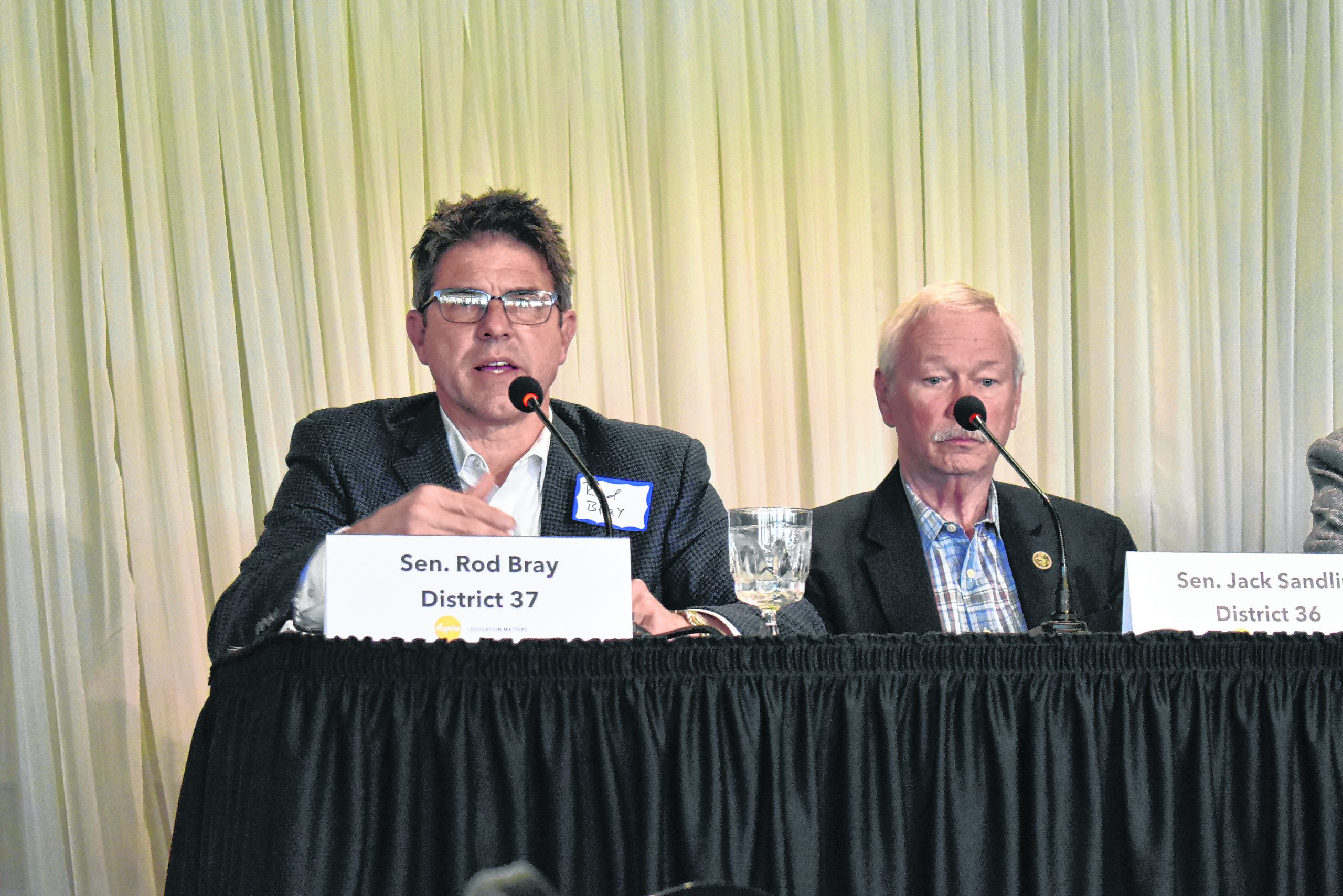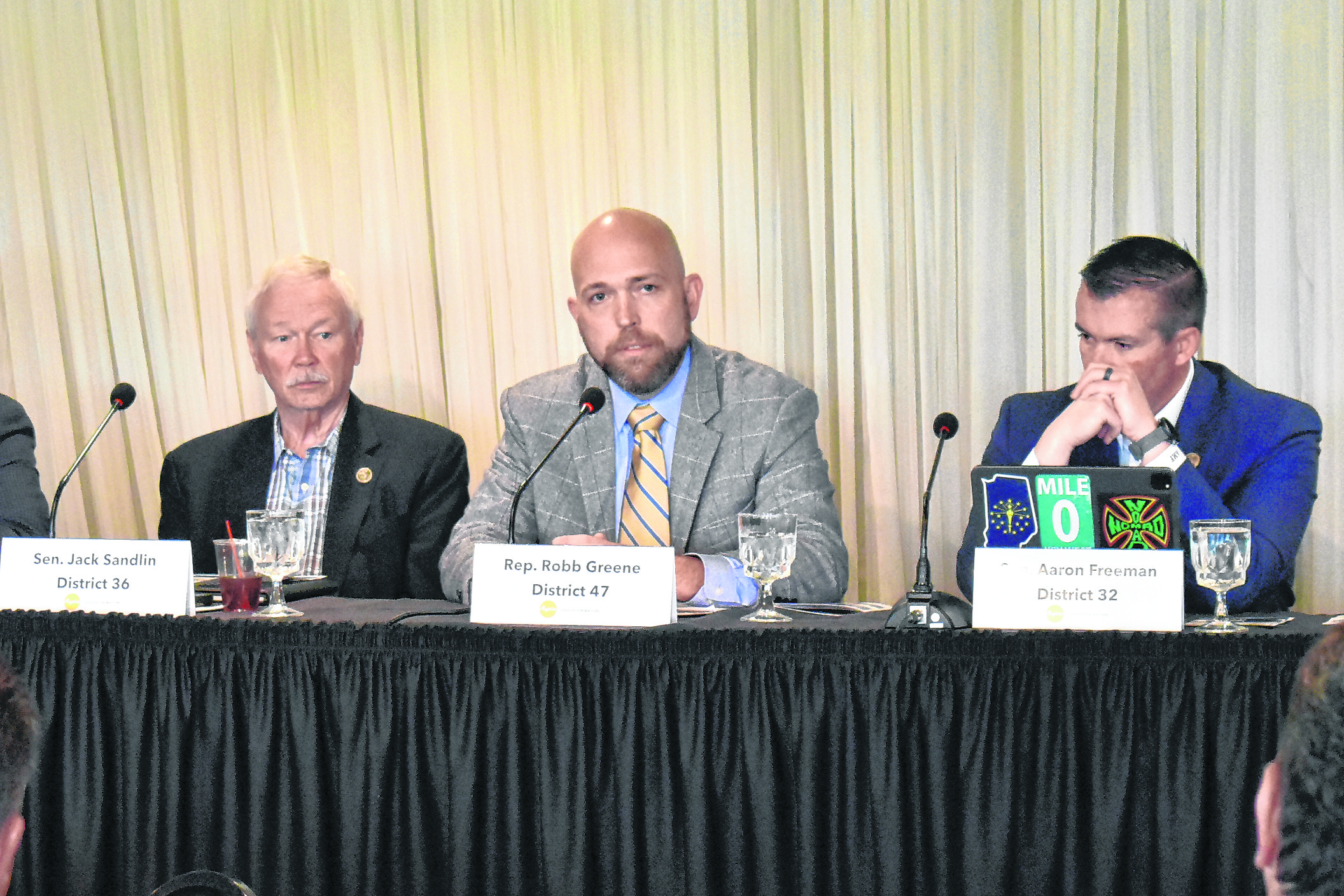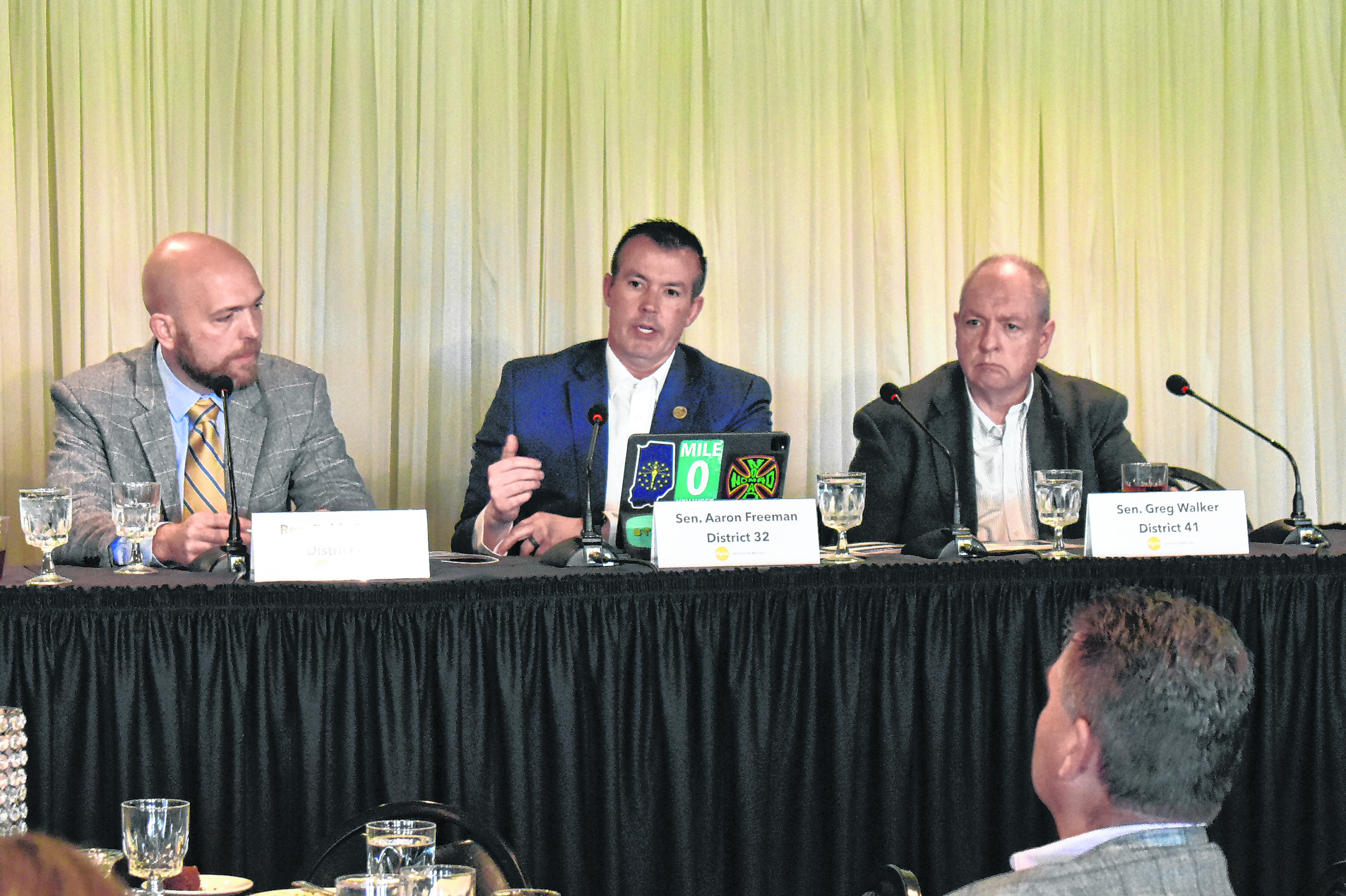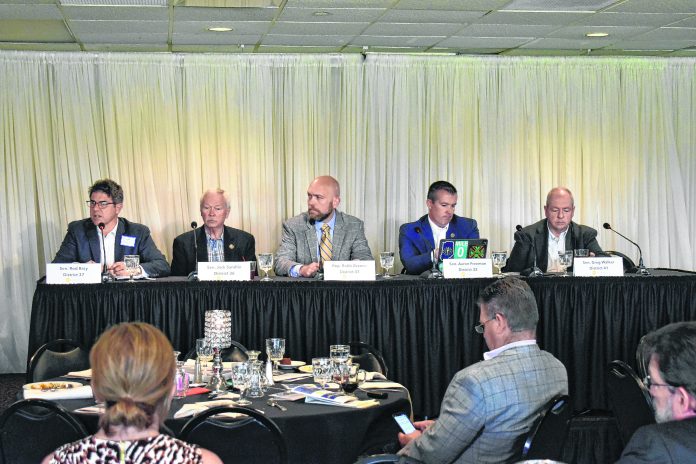
Education and the budget dominated the discussion as local state lawmakers took part in an Aspire Johnson County panel Friday.
Five of the eight lawmakers representing Johnson County gathered with business leaders to speak about the current legislative session as part of an Aspire Johnson County’s Legislation Matters Luncheon series. The event was held Friday at Valle Vista Golf Club and Conference Center.
Since January, lawmakers have been at the Indiana Statehouse drafting and voting on new state laws and policies and working on the state’s two-year budget. Both chambers are expected to adjourn by April 29.
Lawmakers spoke about education, the budget, taxes, families, housing and their accomplishments from the session so far during Friday’s panel.
Education
Education-related bills occupied the first half of the panel discussion Friday, including House Bill 1002. The bill seeks to expand work-based learning in Indiana high schools, such as apprenticeships, job shadowing and internships.
The bill would also create a framework for students to earn a post-secondary credential before leaving high school, and establish career scholarship accounts, or CSAs, students could use to pay for workforce training.
H.B. 1002 was amended in a Senate committee last week to remove language and funding intended to boost school-to-work activity. State Rep. Robb Greene, R-Shelbyville, said he hadn’t seen the amendment yet but was supportive of the original bill.
“I think it’s an important measure for people,” Greene said. “I’ve had several people in my district even reach out to me saying, who are educators themselves, wishing they could get kids earlier engaged on a track like that.”
Greene also said he would prefer the bill kept its full funding, but he’ll have to take a look at what changes were made.
Senate President Pro Tem Rod Bray, R-Martinsville, said the idea of CSAs was “forward-thinking,” but some senators had challenges about whether the school-to-work program was ready to go yet.
“It can be pretty complicated to figure out, alright, who keeps track of that child? If there’s a discipline issue, which would hopefully be rare but is probably going to happen from time to time, who handles that?” Bray said. ” … This is another good alternative but (we) just need rational conversation.”
Sen. Aaron Freeman, R-Indianapolis, discussed Senate Bill 402, a bill he co-authored that addresses reading standards and curriculum. The bill would require “science of reading” curricula in Hoosier schools. This reading method incorporates phonemic awareness, phonics, fluency, vocabulary and comprehension.
“Other than the budget, there’s probably no more consequential bill we’re gonna pass than this one,” he said. “Indiana, to no fault of the teachers, to no fault of anybody, we have just gone down the wrong path. … The most fundamental thing that we will teach kids to do is to read and we got off the track.”
Business leaders later asked lawmakers about what the state could do to resolve teacher pay and retention issues. Freeman said state lawmakers have given $2 billion more dollars over the last few years for K-12 education.
But when he talks to teachers, they say they didn’t get a raise. However, the superintendents did, and Freeman suggested the legislature should consider looking at administrator pay.
“Why it is that we’re paying so much money to K-12 education, and not enough of that is getting to the teacher who’s actually teaching the child in the classroom,” Freeman said. “Let’s start with the overhead, the administrative costs, of that.”
Budget and taxes
Lawmakers also discussed the budget, including the Senate’s proposal. The Senate’s proposed budget did not fully fund the mental health and public health requests that were originally contained in other Senate bills, and there has been discussion about funding these requests through other avenues, like taxes and fees.
While it’s true the Senate isn’t fully funding either of these requests yet, they are funding public health for $225 million and mental health for $35 million, Bray said. There needs to be more funding, he said, and lawmakers are having conversations about how to best do that.
“Over in the house, there was some conversation about a cigarette tax,” Bray said. “We’ve talked about that for a number of years. But it hasn’t really been discussed and debated much this legislative session.”
House members discussed raising the cigarette tax and the alcohol tax last week to help fund the requests. There was a lot of debate about this, but it’s a moving target at this point, Greene said.
Another possibility for mental health funding could come from establishing a fee for the new 988 hotline, which was created to connect people to mental health resources. Lawmakers could attach a fee of up to $1 to phone bills for this, but they have no intention to do so as of right now, Bray said.
Bray also addressed the upcoming revenue forecast which will come out on Wednesday, a day after the budget is expected to be passed out of the Senate. The final numbers are ultimately what lawmakers will pass the budget on, he said.
“We don’t expect a lot of new money to come from that forecast, but maybe some,” he said. “So we might free up some other opportunities as well.”
Bray said that if revenue does go over what is currently projected for the budget, he does not expect there to be another taxpayer refund. Legislators would discuss where to put the extra funds, whether it be for public health, mental health or education vouchers, he said.
Lawmakers also are looking at paying down the state’s unfunded pension debt as an option, said Sen. Jack Sandlin, R-Indianapolis. This is a priority, Bray said.
“That’s one of the things we’re continuing to try to tackle and get that paid off as quickly as possible,” he said.
Families and housing
Sen. Greg Walker, R-Columbus, highlighted a bill he co-authored that would expand eligibility for Temporary Assistance for Needy Families, or TANF, funding. Currently, eligibility is capped at 70% of the federal poverty level, and the bill would increase eligibility to 50% of the poverty level by 2026.
This is important for helping struggling families and encouraging people to return to the workforce, Walker said.
“I’m hopeful that that will contribute to improving that,” he said.
Lawmakers also discussed efforts involving housing, and more specifically, workforce housing.
Both the House and the Senate had bills to address housing. H.B. 1005 is essentially a grant process where dollars would be given out to communities to help bring in infrastructure to lower the cost of residential development, Bray said.
The Senate’s housing bill, S.B. 300, would’ve allowed local governments to create residential tax incremental financing districts for areas in need of development, he said. Language from this bill was later inserted into H.B. 1005 by senators, and the bill will be back before the Senate later this week.
“It’s a good bill. I think it’s going to be very helpful in trying to encourage more affordable housing across the state of Indiana,” Bray said.
Accomplishments
Lawmakers were also asked about what bills and work they were proud of this session.
Walker said he is pleased with the work done by the Senate’s Family and Children Committee, which he chairs. A few bills were passed out of committee regarding foster families and providing more oversight of the Department of Child Services, he said.
Freeman, Sandlin and Greene highlighted the bi-partisan efforts of lawmakers to pass bills that matter to Hoosiers.
“There’s been passionate disagreements, but, I don’t know, 90+ percent of the time these bills pass in a very bipartisan way, sometimes in a unanimous way,” he said.
One such bill is S.B. 415, authored by Sen. Rodney Pol, D-Chesterton, which says that if law enforcement officers lie to a juvenile while interviewing them, the statements cannot be included in court proceedings. Freeman supported the bill, and it passed unanimously out of the Senate, he said.
“It’s one thing if you come to me and say, ‘Hey, I got this evidence and you’re guilty,’ right?” Freeman said. “It’s a different thing when you’re doing it to a 14-year-old. They don’t know any better and they don’t know how to react to that.”
Sandlin highlighted S.B. 46, saying it was the first property tax reform bill they’ve had out of the legislature in a very long time. The bill would authorizes a county’s fiscal body to adopt an ordinance to provide a credit against property tax liability for qualified individuals, which are generally people who have lived in their homes for more than 10 years or who are 55 years or older.
It would help keep long-established residents from running out of their neighborhoods due to rising property values, he said.
“It will keep people in the neighborhoods and keep our neighborhoods diverse,” Sandlin said.
Greene, who is close to completing his first session, said he’s proud of H.B. 1279, his bill that would protect restaurants from “menu scraping” by third party delivery services, a term used to refer to delivery companies that upload a restaurant’s menu and logo to their platform — and deliver their food — without their consent.
“I was really happy to work with other people and educate them and help our local leisure and hospitality industry,” Greene said.
He also said he hoped another project of his would make it out of conference committee as part of Senate bill. H.B. 1159 would have created a tax credit to help incentivize and start conversations with employers about hiring individuals who have an intellectual or physical disability.
The House bill did not get a hearing, which is what Greene expected. However, he said he received word it may be inserted into a Senate bill that will be going before the Senate on Monday.


